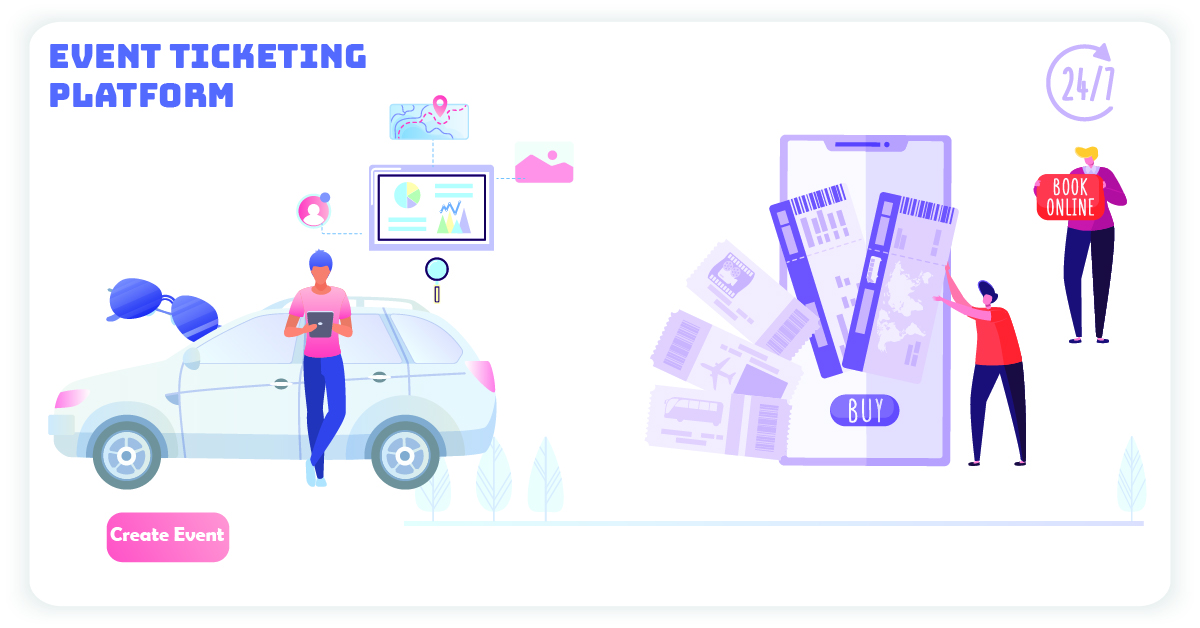Welcome to the world of event ticketing platforms – where planning and managing events is easier than ever before! Whether you’re an event organizer looking to streamline your ticket sales or an attendee searching for the perfect event to attend, an event ticketing software can make your life a whole lot easier. And lucky for you, you’ve come to the right place!
Planning events can be stressful. With so many platforms available, each with their own features and capabilities, it can be overwhelming to choose the right one for your event. In this blog post, we’ll cover everything you need to know about event ticketing platforms, including what they are, how they work, why you should use one, and what features to look for. By the end of this post, you will have a clear understanding of what to look for in an event ticketing system to make your ticketing process a breeze and increase your event’s success.
So, sit back, relax, and get ready to learn everything you need to know about event ticketing.
What is an Event Ticketing Platform?
Background on the origins of Event Ticketing Services
The origins of event ticketing services can be traced back to the late 19th and early 20th centuries when mass entertainment events, such as circuses, fairs, and concerts, became popular in the United States and Europe. Prior to the development of ticketing platforms, tickets were typically sold through box offices at the venue or at physical ticket outlets, such as record stores or newspaper stands.
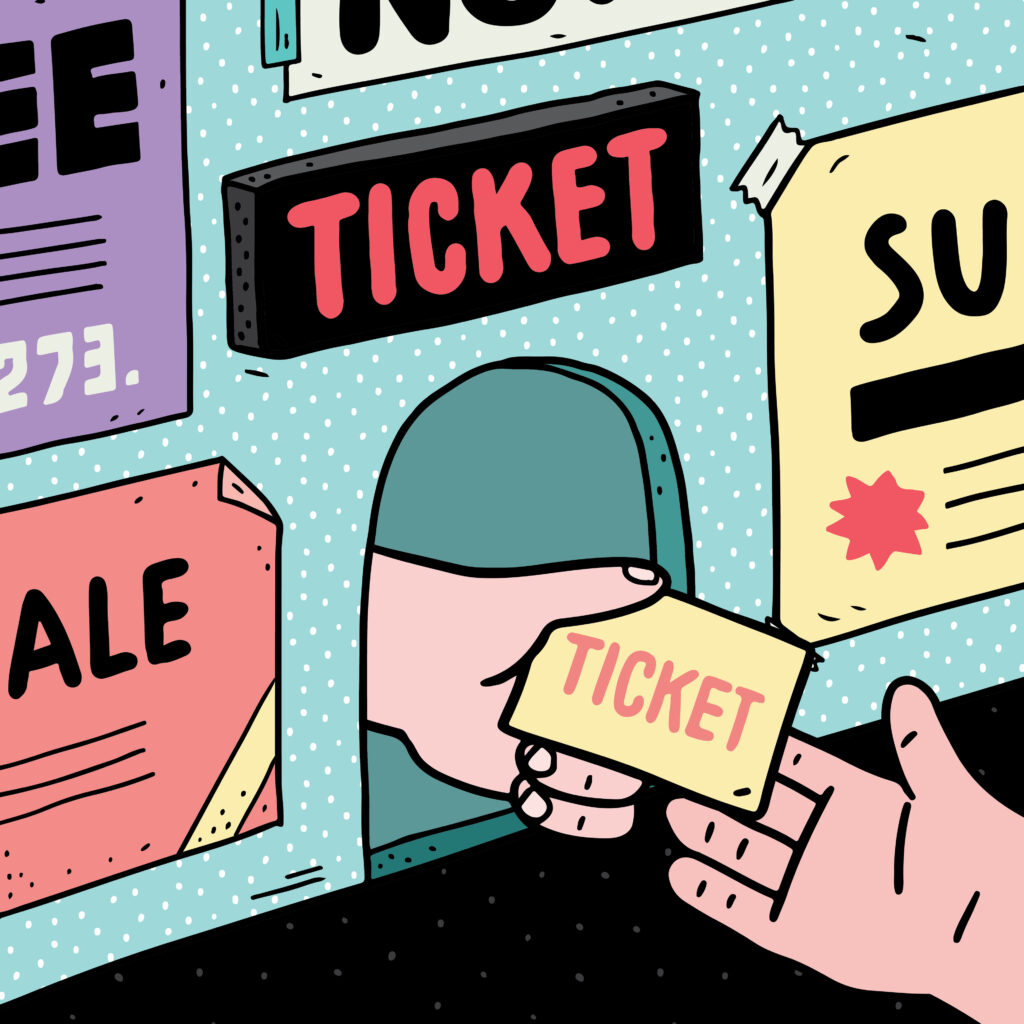
The first known event ticketing platform was created in 1908 by Ticketmaster founder Albert Leffler, who began selling tickets for events in the Midwest United States. In the early days, the company used a manual system to manage ticket sales and distribution, but eventually moved to electronic systems in the 1970s and 1980s, as computer technology became more advanced.
The advent of the internet and e-commerce in the 1990s provided a major opportunity for the development of online ticketing platforms, which allowed customers to purchase tickets from the comfort of their own homes. Ticketmaster was one of the first companies to offer online ticket sales, launching its first website in 1996. Other companies, such as StubHub and Eventbrite, followed suit and established their own online ticketing platforms in the years that followed.
Today, event ticketing platforms are an essential part of the event industry, providing organizers with the tools they need to manage ticket sales, marketing, and distribution. These platforms offer a range of features, such as real-time reporting, mobile ticketing, and marketing tools, to help event organizers increase attendance and revenue for their events.
Understanding the basics of a Ticketing Platform
An event ticketing platform is a special kind of website that facilitates the sale and management of tickets for events. The platform enables event organizers to create and manage events, set up ticket types and pricing, and sell tickets to customers. Event goers can purchase tickets online to go to fun events such as concerts, plays, sports events and art exhibits. They can then print the tickets, or receive mobile tickets, as well as manage their ticket orders.
When someone plans an event, they need to make sure they can sell tickets to the people who want to come. An event ticketing platform helps them do that! The platform provides an efficient and streamlined approach to event ticket sales, reducing the need for traditional paper-based ticketing, so you don’t have to go to a real store to get one. These platforms integrate various features such as online payment processing, customer data management, and analytics to help event organizers track ticket sales, understand customer behavior, and maximize event revenue. This way, event organizers don’t have to worry about keeping track of who’s buying tickets and how many tickets are left. They can just use the event ticketing platform to sell tickets and keep everything organized.
Moreover, event ticketing platforms enable event organizers to promote their events by integrating with various social media platforms and other marketing channels. It allows organizers to send promotional emails, create custom ticket pages, and collect customer data to refine their marketing efforts.
In summary, an event ticketing platform is a web-based solution that simplifies the process of selling and managing tickets for events. It provides a range of features to enhance the customer experience, streamline event management, and improve marketing efforts. So next time you want to go to a cool event, just go to the event ticketing platform and buy your tickets there.
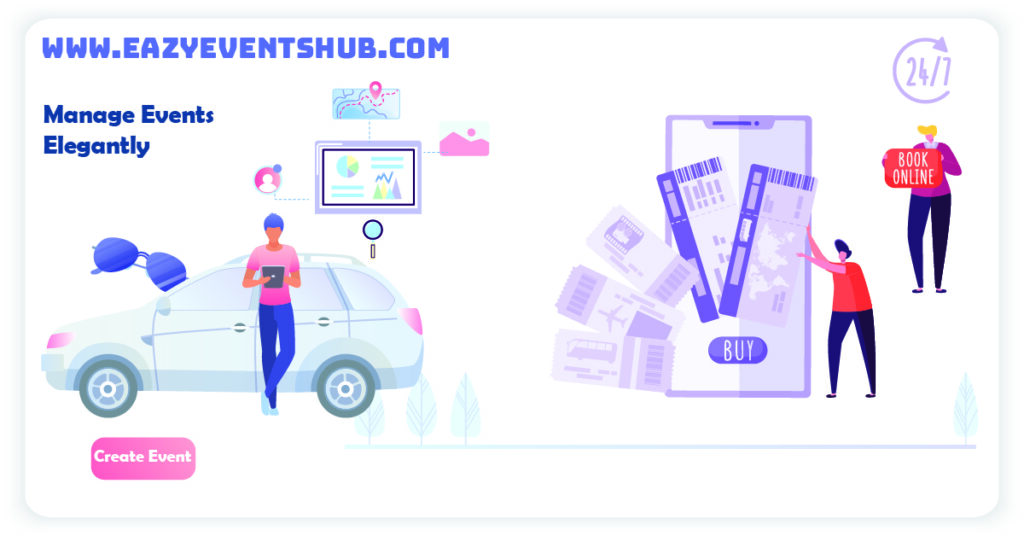
How does an Event Ticketing Platform work?
- Event organizers sign up for an event ticketing platform: An event organizer can sign up for an event ticketing platform by providing basic information about their event and their organization, such as the event organization/team details, event name, date, time, and location.

- Create and manage events: Once the organizer has signed up, they can create and manage their events through the platform. They can set up ticket types, pricing, and availability, as well as manage event details such as the venue, performers, and sponsors.
- Fact: According to a report by Grand View Research, the global event ticketing market size is expected to reach USD 67.99 billion by 2028, growing at a CAGR of 5.4% from 2021 to 2028. The same report also highlights that the COVID-19 pandemic accelerated the adoption of digital ticketing platforms due to the need for contactless ticketing solutions.

- Event goers purchase tickets: Once the event is set up, customers can start purchasing tickets online. They can visit the event ticketing platform’s website or mobile app to search for events, select the event they want to attend, and purchase tickets online. They can choose their preferred ticket type, pay for their tickets securely online, and receive their tickets by email. The platform generates unique QR codes or barcodes for each ticket purchased. The payment for the ticket purchase can be made through various payment options, such as M-Pesa, Visa and PayPal, which are secure payment processing solutions.
- Trend: Mobile ticketing is becoming increasingly popular, with 62% of event-goers now preferring to use mobile tickets over traditional paper tickets.
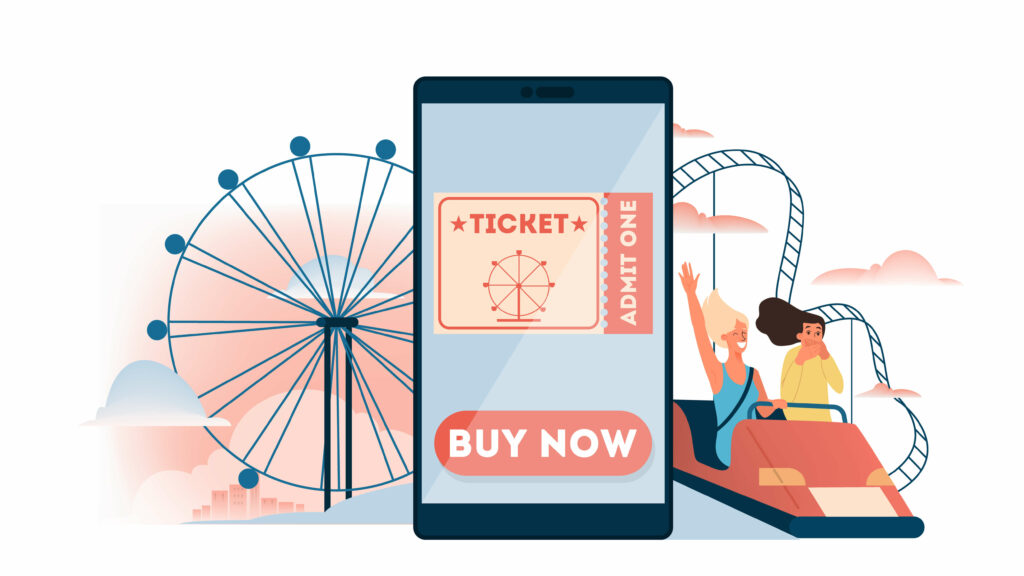
- Event organizers manage ticket sales: The event ticketing platform provides event organizers with real-time insights and data about their ticket sales. They can monitor ticket sales, track customer behavior, and analyze event performance to make informed decisions about pricing, promotion, and capacity.
- Event organizers promote their events: Event ticketing platforms allow event organizers to promote their events through various channels, such as social media, email, and targeted advertising. This helps them to reach a wider audience and sell more tickets.
- Trend: Event ticketing platforms are also integrating with social media platforms to help event organizers promote their events more effectively. Events with at least one social share generate 115% more ticket sales than events with no social shares.
- Attendees enjoy the event: On the day of the event, the customer presents their ticket at the venue entrance, and the ticket is scanned using a smartphone or handheld scanner. This process ensures that only valid tickets are used and reduces the risk of fraud. Attendees can now enjoy their experience, safe in the knowledge that they have secured their tickets through a reliable and secure event ticketing platform.

Overall, event ticketing platforms offer event organizers a streamlined and efficient way to sell tickets, manage events, and analyze performance. With the global event industry continuing to grow, event ticketing platforms are set to play an increasingly important role in the years to come.
What Features to look for in an Event Ticketing Software?
If you are looking for the best event ticketing software, it is important that you choose one that has all the features you’ll need to run a successful event.
Event ticketing systems can be a powerful tool for event organizers, but it’s not a one-size-fits-all type of technology. Here are some of the most important features to look out for:
Simplified Event Setup
Are you tired of wasting valuable time setting up for events? An efficient event setup is crucial for success, and the last thing you want is to experience delays in getting everything ready.
That’s where a powerful and user-friendly event ticketing software comes in. With the right tools, you can quickly and easily create and sell tickets to your events, giving you more time to focus on the things that matter most.
When selecting a ticketing platform, be on the lookout for one that has a wealth of features, but also offers a simple-to-navigate dashboard. With a clear overview of your event, you’ll be able to take proactive steps when necessary.
A streamlined event setup and ticket management process is essential, and that’s why we recommend choosing a platform that offers a simple interface and guided setup. With features such as guided onboarding, bulk editing tools, the ability to copy existing event functionality, and a single interface setup, you’ll be able to manage your events like a pro.
Customization
A good event ticketing platform should allow you to customize your ticketing page to match your brand and event.
Event organizers can customize their event page in several ways, including:
- Branding: adding logos, images, and color schemes to match their brand or event theme.
- Content: adding detailed event descriptions, schedules, speakers, and sponsors.
- Ticket Types and Pricing: setting up different ticket types (e.g., VIP, Early Bird, General Admission) and pricing options, including discounts and promotional codes.
- Registration Forms: creating customized registration forms with required or optional fields to collect attendee information.
- Social Media Integration: adding social media sharing and follow buttons to promote the event and engage with attendees.
- Communication: setting up email templates and automated messages to keep attendees informed about event updates and logistics.
- Surveys and Feedback: collecting attendee feedback through surveys and feedback forms to improve future events.
Payment Processing
The platform should offer a secure and easy payment processing system that supports multiple payment methods such as credit cards, mobile payment, PayPal, etc.
The event ticketing software should have existing integrations with multiple payment options so that you avoid losing customers at the last step at checkout.
Choose a solution that offers a secure, convenient and hassle-free payment experience.
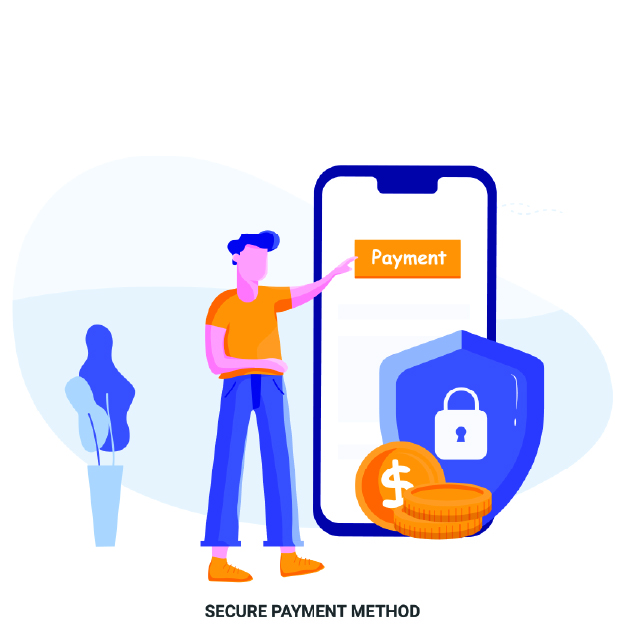
Ticket Validation at Check-in
The platform should offer a way to scan and validate tickets at the event to ensure only valid tickets are being used. This will help prevent fraud by preventing attendees re-using the same ticket.
Therefore, look out for a ticketing system that comes integrated with a QR ticket scanning app, which makes event check-in easier than ever. Attendees receive tickets directly to their mobile devices, and venues just scan a QR code on arrival for automatic validation.
Reporting and Analytics
Sometimes, there’s so much data to manage about attendees and events that it can feel overwhelming. However, with the right event ticketing platform, you can access this data in a way that makes sense for you.
Choosing a platform that comes equipped with reporting tools can help alleviate the burden of manually sorting through data. This way, you can quickly gain insights into sales, attendance, and payment reports without being inundated with spreadsheets.
By managing all aspects of your events and data in one platform, you’ll have a better understanding of your most critical analytics. You can link your entire event overview, including pre-sale, real-time, and post-event action, from one dashboard, enabling you to make smarter decisions.
Key features to look for in a platform include custom reports, a visual dashboard, export functionality, and real-time data synchronization. By utilizing these features, you’ll be able to gain meaningful insights into your event data and make informed decisions that can drive success.

Event Marketing
Effective event marketing is key to driving attendance and engagement for your event. When selecting an event ticketing platform, it’s essential to look for features that enable you to market your event and reach your target audience.
One of the critical features to consider is the ability to create event listings (event page) that showcase your event’s key details and benefits. This information should be presented in a way that’s attractive and easy to understand for potential attendees. The platform should offer customization options for the event listing to help you tailor it to your brand and target audience.
Another vital feature to look for is social media integration, which allows you to share your event listings across various social media channels. This feature can help you reach a wider audience and increase engagement with potential attendees.
Email marketing is also an essential aspect of event marketing. The platform should allow you to send email invites to your target audience, which can include event updates, registration reminders, and exclusive promotions. This feature should also provide customization options for your email templates, such as branding elements and messaging, to help you personalize the content and increase the likelihood of conversions. Emails are a great way to strengthen your brand recognition, ensuring better engagement with existing fans and luring in new customers. Having the ability to design custom emails can help you to stay on your target audience’s mind even after the event has ended.
Overall, an effective event marketing strategy requires a platform that enables you to create attractive event listings, share them across various channels, and communicate effectively with potential attendees. These features can help increase attendance, engagement, and overall success for your event.

Flexible Ticketing Fee
The cost of online ticketing fees is on the rise and can sometimes create tension between event owners, attendees, and ticketing platforms. Many event owners are unhappy with having to bear the brunt of these fees, especially when ticketing providers require them to pay a fee for every ticket sold.
However, there is a shift towards greater flexibility in this area, with some ticketing providers giving event organizers the option to choose who pays the fees. This means that organizers can either absorb the cost of the fee themselves or pass it on to buyers as a surcharge.
It’s important to look for a ticketing system that offers this feature, so you can customize your fee preferences for each event. This allows you to have greater control over your event’s pricing structure.
Key features to look for include flexible fee options, the ability to absorb or pass on fees, affordable pricing and transparent pricing with no hidden fees.
Mobile Optimization
The platform should be mobile-friendly and allow attendees to easily purchase tickets and access event information from their mobile devices.
Customer Support
The platform should offer reliable customer support to help you with any issues or questions you may have.
With these key features in mind, you’ll be well-equipped to choose an event ticketing platform that meets all of your needs as an event organizer. By selecting a platform that offers streamlined event setup, convenient payment options, customizable event pages, effective marketing and promotional tools, and robust reporting and analytics, you’ll be able to focus on the things that matter most: creating an unforgettable event experience for your attendees.
Why Eazy Events is the best option for event organizers and attendees in Nairobi, Kenya?
If you are looking for a hassle-free way to manage and sell tickets to your events in Nairobi, Kenya, look no further than Eazy Events! Our user-friendly platform makes it easy for event organizers to streamline the ticketing process and reach a wider audience.
Here’s why Eazy Events is the best option for you:
- Convenience: Our platform offers convenient payment gateways, and a seamless checkout experience for attendees.
- Customization: With Eazy Events, you can customize your event page and ticket types to suit your specific needs, and even set up a personalized event website.
- Marketing: You can market your event through event listings, social media sharing, and email invites to potential attendees, all from within our platform.
- Reporting and Analytics: Our platform provides custom reports, visual dashboards, export functionality, and real-time data sync to help you manage your events and make smarter decisions.
- Fee flexibility: You have the option to absorb or pass on ticketing fees to buyers, with low pricing and no hidden fees.
Don’t settle for a clunky and confusing ticketing platform. Choose Eazy Events for a streamlined and stress-free ticketing experience.
Conclusion
In conclusion, understanding event ticketing systems is crucial for anyone looking to host an event, whether it’s a small-scale gathering or a large conference. By using an event ticketing platform like Eazy Events, you can streamline your ticket sales process, increase your revenue, and offer your attendees a hassle-free experience. With features like customizable ticket types, real-time sales tracking, and integrated payment processing, Eazy Events is the ultimate resource for event organizers who want to take their events to the next level.
